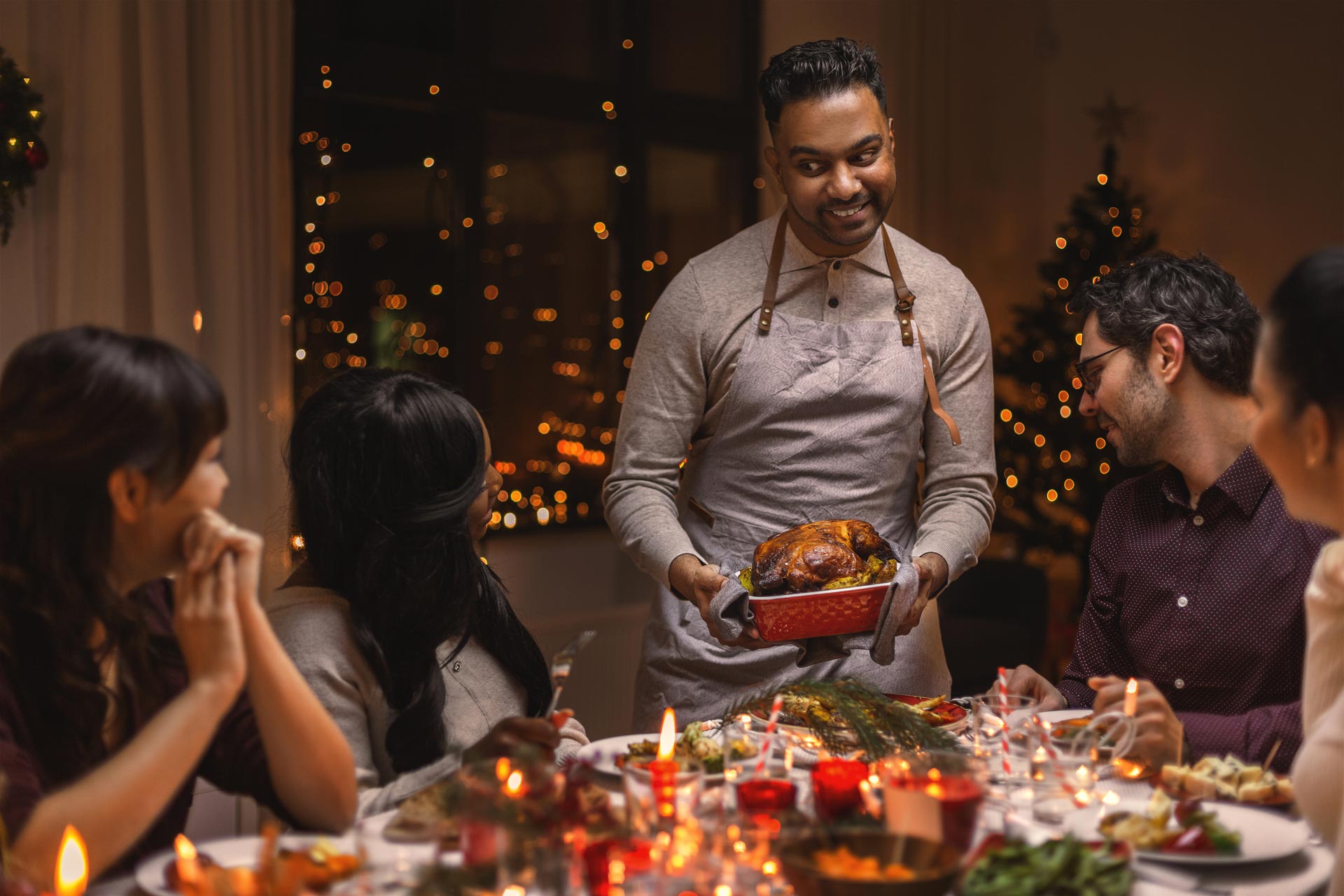
We all have that one relative (or friend) at whose house we fear going to dinner. Stop pretending. You know it’s true. Whether they are known to serve dry ham, overcooked and bland macaroni pie, or badly burnt black cake, suffering through dreadful holiday meals creates bad memories instead of moments that we can fondly reminisce about.
So, imagine being a person with dietary restrictions who is rarely accommodated at a gathering. Could you forgo a delicious-smelling meal and sip pipe water while everyone else pats their bellies and belches? Trust me, this happens.
Let me share a story with you.
There we were around the dinner table anticipating the main course. The host was a popular chef, and this was the first big holiday dinner party after pandemic restrictions were lifted. As the servers entered the dining room with plates of deliciousness, the person to my right dipped into her handbag for a Tupperware container. She shyly inverted the contents onto her plate. The beige meal indicated that she had dietary restrictions. As a former chef, this is something I can easily recognise. After asking, she confirmed.
She said that she didn’t want to miss the party as she craved human connection. But after speaking with the host, she decided it was easier to bring her own meal. The reality is, what she brought along was a pared down and lesser seasoned version of our meal. The host didn’t even offer to warm it up. Talk about bush league hosting. I haven’t spoken to him since, and she and I regularly share a meal together. It can be done.
You see, (most) people don’t adopt a restrictive diet or forego alcohol to be difficult or for style. Yes, you may still kiss your teeth whenever you think of that “vegan-keto-paleo” friend — OK, that’s me trauma-dumping — but for others, it’s terrifying to eat outside the home. Certain foods make it difficult to breathe (we need air, right?), will send them running to the toilet (not fun at a party), or land them in the hospital (in this economy?).
In addition to well-known health issues such as celiac disease (can’t have gluten) and lactose intolerance (no dairy), there are autoimmune diseases like Mixed Connective Tissue Disorder that mean you can’t eat garlic, processed foods, sugar or salt. There are many as well who don’t have full-blown allergies, but still have a range of food sensitivities.
Here are some facts. There are over 160 foods that can cause allergic reactions, and food allergies affect approximately 220 million people globally. In the United States, someone is admitted to the emergency room for food-induced anaphylaxis every two to three minutes.
Any food can cause allergic reactions, but scientists have identified eight that are most troublesome: shellfish, tree nuts (almonds, pistachios, cashews etc), dairy, peanuts, eggs, fish, wheat and soy. If that’s not restrictive enough, I have Caribbean-born friends who will break out in a rash or blisters if they eat ackee, anything curried, thyme, ginger, onions and hot peppers. Talk about an affliction!
Though it requires some juggling, you can host a holiday dinner/party that considers people with restrictive diets or who are abstaining from alcohol. Here are a few tips so you can be the MVH (most valuable host) this holiday season.
Ask. Create a WhatsApp group of all the invitees…or, if your family or circle is known to incite drama, send an email with all the guests in the bcc line. Ask if they have dietary restrictions, allergies, or need to avoid alcohol, pork, or shellfish for health or religious reasons. Ask them if they are OK with other guests consuming them in the same space. If they aren’t, consider food and drink that everyone can enjoy.
Educate. Sober doesn’t mean boring. Whether your guests are in recovery, pregnant, religiously devout, diabetic, or just don’t want to partake, offer a selection of alcohol-free beverages. Make batches of sorrel with no rum (you’ll manage) and fresh unfermented ginger beer. There’s something about the holidays and hot “cocoa tea”. Create a nostalgic moment by serving traditional Caribbean hot chocolate laced with nutmeg.
Request. Ask guests with the most severe dietary restrictions to give you recipes or bring a dish. Inviting them to participate in steering the meal makes them know how much they’re valued and that the event won’t be the same without them. Name the dish after them and let everyone broaden their horizons through empathy.
Plan. Don’t attempt recipes you’ve never tackled before. This is not Chopped! Do a couple of test runs in the weeks leading up to the event. Write out the to-do list and be sure to thoroughly clean surfaces and utensils between the preparation of each dish. On the day of the event, have some antihistamines and an EpiPen on hand.
Cater. If you’re not confident in your skills to create a tasty dairy- and sugar-free cake or a gluten-free vegan dish, call up a chef, restaurant or caterer specialising in free-from dishes.
Conceptualise. Consider a theme. This may take some convincing, especially if you’re hosting dinner on 25 December. But serving menu items that satisfy many diets without sacrificing flavour is the way to go. Why not serve Ital or Thai food (dishes are dairy-free) or host a vegetarian Indian Christmas feast (many of these dishes are gluten-free)?
Create. Serve sugar-free or no-sugar-added desserts. Many Caribbean families have diabetic members and it’s about time we include them in the final course of the evening. After all, most of us have the urge for something sweet after dinner, but no sense in losing a foot over a slice of pound cake. Suitable items include in-season fruit and cakes baked with honey or coconut sugar. If you’re a skilled baker, try sweet potato pudding/pone or conkie/dukunoo which can rely on the natural sweetness of their ingredients.
And finally…
Respect. Let folks know they should be on their best behaviour. No need to comment on people’s weight or what they are not eating or drinking. Set boundaries. Maybe it’s time we banish that inappropriate uncle to the back verandah under the watchful eye of your no-nonsense cousin.
Caribbean festivities, especially holiday feasts, aren’t without their pickles, and our culture bonds by eating together — it is deeply symbolic. Most traditions are rooted in food rituals, and there are numerous physical and spiritual benefits of eating together. But being fed isn’t the same as being nourished. And there’s immense value in listening, understanding, and respecting those whose needs and experiences differ from our own.
Our history is rooted in listening; after all, griots were revered walking encyclopaedias. Holiday food rituals are important, but human connectedness matters most. Listening builds trust, deepens relationships, and helps eliminate conflict. And according to acclaimed Jamaican-American poet Claudia Rankine, we can “listen someone back to life.”
